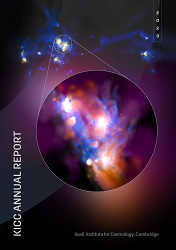
Submitted by S. Brereton on Fri, 06/10/2023 - 13:15
The UK will play a crucial role in a landmark mission to trace patterns in the light from space, looking back almost to the Big Bang, bringing us closer to understanding the nature of our Universe and how it began.
The Japanese-led LiteBIRD mission (‘Light satellite for the study of B-mode polarization and Inflation from cosmic background Radiation Detection’) will analyse variations in light left over from the Big Bang, to test whether the current theory of how our Universe expanded immediately after it was formed (cosmological inflation theory) is correct. The UK Space Agency has committed an initial £2.7 million to the mission and intends to invest a total £17 million throughout the life of the mission, slated for launch before 2030. Researchers in Cambridge will be developing and applying methods to remove the effects of gravitational lensing by large-scale structures in the LiteBIRD data, which otherwise contaminate the subtle B-mode pattern of polarization produced by gravitational waves from cosmic inflation.
Further information available at https://www.gov.uk/government/news/uk-joins-mission-to-trace-universe-back-to-the-big-bang
Image Credit: CreditISAS/JAXA


